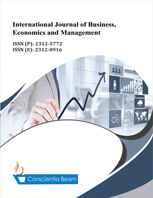The Impact of Data Frequency on the Level of Exchange Rate Pass-through to Consumer Prices in Nigeria
DOI:
https://doi.org/10.18488/journal.62.2020.76.411.426Abstract
This paper investigates the differential impact of data frequency in determining the degree of exchange rate pass-through (ERPT) to consumer prices in Nigeria. The study used annual and quarterly time-series data for 1986- 2013 period. The paper examined the level of long-run ERPT, the speed of adjustments and short-run ERPT using ARDL model. We found high and statistically significant ERPT in the long-run, which is in contrast with the previous studies on Nigeria. The results using quarterly data revealed incomplete ERPT to consumer prices. This paper shows that studies which use higher frequency data are more likely to get incomplete ERPT in the short-run, even in the context of LDCs. In the long-run, incomplete ERPT subsists with the quarterly data while there is a full ERPT for the annual data. The policy implication is that exchange rate stability plays a crucial role in controlling domestic consumer price inflation in Nigeria.

